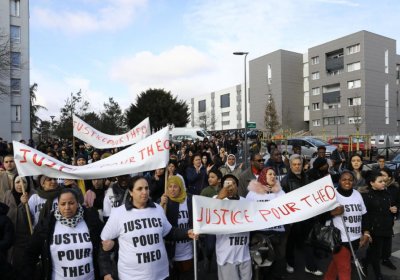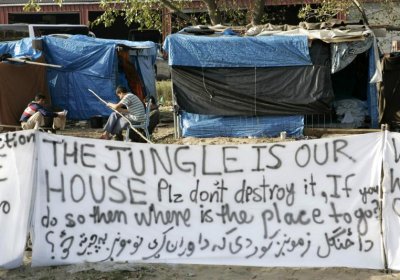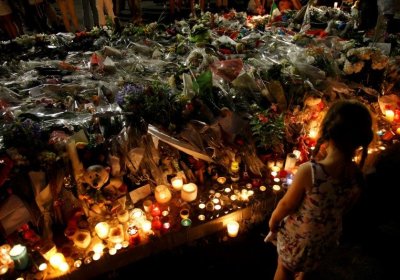Presenting himself as a genuine alternative to the far-right candidate National Front and free-market candidates Francois Fillon and Emmanuel Macron, left-winger Jean-Luc Melenchon who has surged into third sport in France's presidential race, whose first round is set for April 23. The Left Party's Melenchon pitched himself as the candidate for peace and solidarity across borders at a mass meeting on April 8 attended by 70,000 supporters in Marseille.
France
Riots swelled in Paris for a third night on March 29, with hundreds of people protesting against police brutality and the recent killing of a Chinese man, Shaoyo Liu, on March 23 by police.
Riot police hurled tear gas at the crowd as demonstrations continued, with a police car firebombed, three officers injured and 35 people arrested.
Days of angry protests have hit Paris and other French cities after police raped and bashed a 22-year-old Black man on February 2.
Windows were smashed and fires were started in Paris's Menilmontant district on the night of February 8, TeleSUR English said the next day. Activists took to the streets to call for justice for “Theo” after French police were charged over his rape and abuse during a raid on a housing estate in the working-class department of Seine-Saint-Denis. One of the police officers has been charged with rape, while three others were charged with assault.
French authorities announced their operation to demolish “the Jungle”, the makeshift refugee settlement in the northern French port of Calais, was completed on October 26, with refugees bussed to government-controlled centres dispersed throughout France.
But this claim was contradicted by chaotic scenes of the camp in flames and more than 1600 unaccompanied minors being excluded from the transfer to other camps. All the while, British and French politicians bickered over whose responsibility they were.
There is a very sinister, hellish thing behind the tepid concern that rears its head when a country like Haiti suffers a tragedy.
As 800 people died and 90% of parts of southern Haiti were destroyed by Hurricane Matthew earlier this month, leaving whole towns flattened, and people homeless and without basic infrastructure, the trending hashtag was #PrayForFlorida.
More than 170,000 workers and students joined more than 110 protests across France on September 15 against new labour laws that dramatically deregulate France’s labour code.
The situation is deteriorating in “the Jungle” — the informal settlement in the northern French port of Calais of refugees trying to reach Britain.
French police demolished the southern half earlier this year, yet the population is steadily rising and has surpassed 10,000. Neglected by governments and NGOs, the volunteers who provide food, clothing and other aid are receiving fewer donations to assist the growing population. Hunger has become prevalent, along with diseases caused by lack of sanitation.
French workers and students are set to hold a new national mobilisation against the “El Khomri” labour law, which undermines workers’ rights.
The protest is the 14th national mobilisation in the campaign against the law this year — but the first since the law was forced through parliament without a vote and since France's summer holidays.
The six richest countries in the world, who make up almost 60% of the world’s economy, are hosting less than 9% of the total number of refugees in the world, a July 18 report by British charity Oxfam found.
Out of the 84 victims who died in the Nice attacks on France's Bastille Day, at least 30 were Muslims, figures based on the types of funerals required by relatives released by local Nice authorities said on July 19.
- Previous page
- Page 9
- Next page











